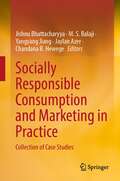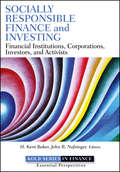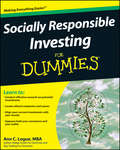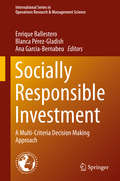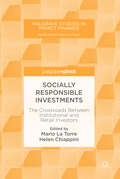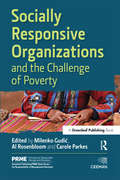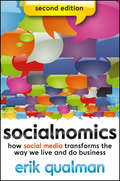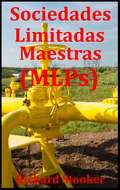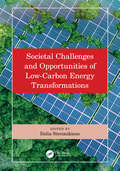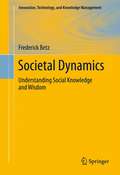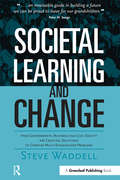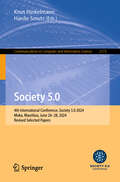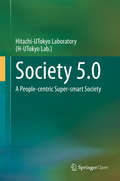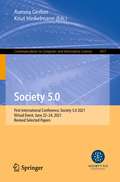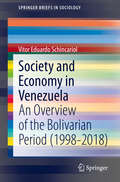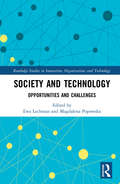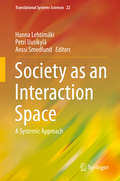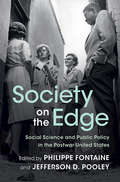- Table View
- List View
Socially Responsible Consumption and Marketing in Practice: Collection of Case Studies
by Jishnu Bhattacharyya M. S. Balaji Yangyang Jiang Jaylan Azer Chandana R. HewegeThe book provides an overview of socially responsible consumption and marketing, as well as a collection of teaching cases that discuss and emphasize how 21st-century organizations, both for-profit and non-profit, are addressing socially responsible consumers and meeting their changing needs while remaining profitable. Consumers, governments, academics, and practitioners are becoming more interested in promoting positive social changes through consumption. As a result, this book aims to understand the practice of marketing in bringing about positive social change through real-life case studies. Consumption by socially responsible consumers who care about the social good is unique, not only because of its inter-disciplinary and substantive subject matter but also because it presents challenges and pushes organizations to make significant changes in the ways they have been accomplishing organizational activities in the twenty-first century, from procurement to production to sales and services. The book goes beyond individual consumers and their lifestyles to promote the scope of discussing marketing strategies. It seeks to comprehend how people consume and how socially responsible consumption is conceived. The case studies present and pursue integrated solutions for more sustainable consumption. This is a must-read for marketers who want to reach out to socially responsible consumers.
Socially Responsible Finance And Investing
by H. Kent Baker John R. NofsingerA detailed look at the role of social responsibility in finance and investing The concept of socially responsible finance and investing continues to grow, especially in the wake of one of the most devastating financial crises in history. This includes responsibility from the corporate side (corporate social responsibility) as well as the investor side (socially responsible investing) of the capital markets. Filled with in-depth insights and practical advice, Socially Responsible Finance and Investing offers an important basis of knowledge regarding both the theory and practice of this ever-evolving area of finance. As part of the Robert W. Kolb Series in Finance, this book showcases contributed chapters from professionals and academics with extensive expertise on this particular subject. It provides a comprehensive view of socially responsible foundations and their applications to finance and investing as determined by the current state of research. Discusses many important issues associated with socially responsible finance and investing, like moral hazard and the concept of "too big to fail" Contains contributed chapters from numerous thought-leaders in the field of finance Presents comprehensive coverage starting with the basics and bringing you through to cutting-edge, current theory and practice Now more than ever, we need to be mindful of the social responsibilities of all investment practices. The recent financial crisis and recession has changed the financial landscape for years to come and Socially Responsible Finance and Investing is a timely guide to help us navigate this difficult terrain.
Socially Responsible Investing For Dummies
by Ann C. LogueGenerate a good return as well as goodwill with this guide to ethical investmentsWant to make money while you make a difference in the world? Socially Responsible Investing For Dummies, a 2010 Green Book Festival award winner, is as practical, hands-on guide to smart social investing that shows you how to maximize your profits while remaining true to your values. You get expert advice in targeting an issue you're passionate about, researching potential investments, and putting your socially responsible choices into action.Get started with social investing basics -- understand what it is, why it works, and how investors define social responsibilityNavigate the socially responsible enterprise -- discover the business principles that help ethical organizations thriveConduct your research -- determine whether an investment has financial potential and also serves your personal needsEvaluate your investment choices -- from stocks and bonds to mutual funds and ETFs to real estate and high finance, select the best investments and adjust your portfolio over timeGet help from the pros -- find brokers, financial planners, and mutual fund companies that can help you with your decisionsEnsure your success -- see how to diversify, monitor your investments, join forces with others, vote your proxies, keep your perspective, and moreKeep up with investment trends -- discover how to take advantage of new investment products and stay on top of industry changesRecognize truly socially responsible investments -- understand how to tell socially responsible investment opportunities from "feel good" opportunitiesIn Socially Responsible Investing For Dummies you will find:A clear introduction to social investingIssues to invest in, from environmental to internationalThe different types of investmentsHow to buy and sellFiduciary responsibilities for the social investorHow to use your investment clout to influence a company's performanceTen social investing traps you must avoidActivist investing success stories
Socially Responsible Investment
by Enrique Ballestero Blanca Pérez-Gladish Ana Garcia-BernabeuThis book integrates socially responsible investment into modern portfolio theory from a multi-criteria perspective. Socially responsible investment is a "new deal" championed by the institutional investment and bank sectors, agents that influence mutual funds and other collective investment schemes and which fear that financial strategies without ethical constraints can harm sustainable growth and prosperity. The book shows how to combine financial criteria such as profitability and risk with non-financial criteria such as the protection of the ecosystem, responsible consumption of energy, and healthcare campaigns. The book's first part presents critical issues in ethical investment, while the second explains in detail the application of goal programming techniques for SRI funds, illustrating their use in actual cases. Part three demonstrates how compromise programming can be applied in the contexts of portfolio selection and risk management. Finally, in its fourth part the book examines the application of other decision-making support methods like the Analytic Hierarchy Process (AHP) framework, the Reference Point Method, and soft computing techniques for portfolio selection.
Socially Responsible Investments: The Crossroads Between Institutional and Retail Investors (Palgrave Studies in Impact Finance)
by Mario La Torre Helen ChiappiniThis Palgrave Pivot aims to build a bridge between corporate social responsibility (CSR) and sustainable finance in financial markets. It investigates classic CSR topics in the light of a modern conception of sustainability. The first part emphasizes four relevant topics in the CSR panorama of financial institutions: banks remuneration practices; human capital disclosure; the impact of environmental performance on banks, and finally, the institutional investors’ attitude towards socially responsible investments (SRIs). The second part explores CSR practices within the financial markets and discusses risk-return profiles of SRI and non-SRI indexes in different time frames. It investigates whether thematic social responsible funds obtain different risk-return than traditional funds, and finally, assesses whether equity crowdfunding could foster social innovation. This book is aimed at scholars and students who are interested in social impact investing and practitioners involved in the social impact market.
Socially Responsive Organizations & the Challenge of Poverty (The Principles for Responsible Management Education Series)
by Milenko Gudić Al Rosenbloom Carole ParkesThis book provides a combination of case studies and current action research describing how businesses and civil society organizations are working to alleviate poverty in local and global communities. It intends to provide conceptual and research rationales for why management education and management institutions must address the issue of poverty. The book responds to one of the major findings from the research of the PRME Working Group on Poverty that the topic of poverty still lacks a strong business case for management educators and program/institutional administrators. The distinctive features of this book are that it: (1) includes examples of small and medium-sized (SME) businesses; (2) deals with the issue of poverty as a human rights violation; (3) explores the issue of absolute versus relative poverty; (4) deals with leadership challenges in organizations committed to poverty alleviation; and (5) discusses the issues in terms of management education’s responsibility for setting new management, research institutional and intellectual agendas. The first of two books to be produced by the PRME Working Group on Poverty, Socially Responsive Organizations and The Challenge of Poverty aims to provide both researchers and practitioners with the most wide-ranging coverage yet published on how business can be a positive force in alleviating poverty and how management education needs to adapt to this increasingly crucial prerogative.
Socialnomics
by Erik QualmanThe benchmark book on to the effects and implications of social media on our daily lives, and how businesses can harness its power Socialnomics is an essential book for anyone who wants to understand the implications of social media on our daily lives and how businesses can tap the power of social media to increase their sales, cut their marketing costs, and reach consumers directly. In this revised and updated second edition, author Erik Qualman presents new material based on meeting with 75 Fortune 1000 companies, 50 colleges and universities, and over 100 small businesses & non-profits since the first edition. Qualman's materials have been used from IBM to NASA to Harvard to local businesses.Lists the top ten easy opportunities that companies and organization miss when it comes to social mediaDescribes where social media should reside in an organization and the necessary building blocks for success Explains why over 50 percent of companies still block social media to their employees and why this is a detriment to successShares proper training methods for your ENTIRE organization on social media; not just the chosen fewReviews the top companies, organizations and individuals using social media, explaining what separates them from other companies and how to replicate their successSocial media can transform your business and your relationship with consumers. Discover what social media can do for you, and what you can do for others while using social media.
Sociedades Limitadas Maestras (MLPs)
by Richard Stooker Caroline L.En un mundo de baja rentabilidad, donde los bonos del gobierno pagan casi nada de interés, las acciones de S&P 500 pagan un poco más en dividendos, el gobierno canadiense impone tributos sobre los fondos de ingresos e incluso los fondos de inversión inmobiliario están sufriendo problemas de flujo de caja, un tipo de valor aún se yergue como un faro de esperanza para los inversionistas de ingresos. Las Sociedades Limitadas Maestras o MLPs 9% de rentabilidad. . . que aumenta un 9% anual. . . distribuciones trimestrales casi garantizadas. . . ganancias de capital que dejan a S&P 500 relegado. . . protección tributaria. . . ganancias comerciales protegidas por la regulación del gobierno federal. . . ganancias del sector de energía sin la volatilidad de los precios de mercado porque las MLP se pagan por volumen, no por precio final. Hasta ahora, la información disponible para los inversionistas ha sido escasa. Internet contiene artículos resumidos pero incompletos y fragmentos de consejos (algunos buenos, otros inexactos). Finalmente, los inversionistas pueden aprender todo acerca de estas magníficas inversiones - sus recompensas y riesgos; las complicaciones del papeleo y cómo evitarlos; y cómo invertir en ellos usando cuentas con impuestos y con impuestos diferidos. Este libro es el primero y el único dedicado exclusivamente a Sociedades Limitadas Maestras (MLPs). Usted descubrirá: los increíbles beneficios de las MLPs... Por qué todavía son increíblemente baratas... Cómo se combinan sus normas legales y estructura de negocios para producirle mucho dinero... Por qué seguirán generando mucho efectivo en un futuro previsible... Información sobre cada empresa... Información de cada índice MLP... Información sobre cada fondo cerrado MLP... Lo que son las unidades-i de MLP y cómo pueden aumentar en forma rápida su cartera de IRA... Cómo comprender y completar los formularios de impuestos MLP... Todo lo que necesita saber para comenzar a
Societal Actors in European Integration
by Wolfram Kaiser Jan-Henrik MeyerContributors to this volume outline how societal actors have been closely involved in European integration from the founding of the EU to the Maastricht Treaty. Based on newly accessible sources, the authors discuss the participation of political parties, business groups and civil society organizations in European polity-building and policy-making.
Societal Challenges and Opportunities of Low-Carbon Energy Transformations
by Dalia StreimikieneLow-carbon energy transformations to support carbon-neutral societies is an important and urgent topic and subject to current national priorities and socio-economic planning. This book addresses the societal challenges and opportunities that come with the transition in EU member states such as energy poverty and inequality, energy security, gender inequality, energy efficiency improvements, climate change mitigation, growth in green investments, etc. It contains a balanced approach of theoretical concepts with an impressive range of relevant case studies to investigate the issues, develop indicator frameworks, identify barriers and drivers, and create policies and measures to unlock opportunities.Features: Addresses systematically and comprehensively the low-carbon energy transition, its barriers, and its societal implications. Discusses the main societal challenges and opportunities of low-carbon energy transition from theoretical and practical points of view. Provides definitions of concepts, measurement indicators, policies, and a framework for overcoming barriers and enforcing drivers. Includes case studies on low-carbon energy transition challenges and opportunities that are developed for EU countries. Encourages discussion on policies and measures necessary to overcome identified barriers and proposes how to promote a just and smooth low-carbon energy transition. This book is a great reference for academics, researchers, graduate students, and professionals such as energy producers, city planners, policymakers, etc. interested in current and emerging trends in sustainable energy.
Societal Dynamics
by Frederick BetzAt both a micro-information level and a macro-societal level, the concepts of "knowledge" and "wisdom" are complementary - in both decisions and in social structures and institutions. At the decision level, knowledge is concerned with how to make a proper choice of means, where "best" is measured as the efficiency toward achieving an end. Wisdom is concerned with how to make a proper choice of ends that attain "best" values. At a societal level, knowledge is managed through science/technology and innovation. And while science/technology is society's way to create new means with high efficiencies, they reveal nothing about values. Technology can be used for good or for evil, to make the world into a garden or to destroy all life. It is societal wisdom which should influence the choice of proper ends -- ends to make the world a garden. How can society make progress in wisdom as well as knowledge? Historically, the disciplines of the physical sciences and biology have provided scientific foundations for societal knowledge But the social science disciplines of sociology, economics, political science have not provided a similar scientific foundation for societal wisdom. To redress this gap, Frederick Betz examines several cases in recent history that display a fundamental paradox between scientific/technological achievement with devastating social effects (i.e., historical events of ideological dictatorships in Russia, Germany, China, and Yugoslavia). He builds a new framework for applying social science perspectives to explain societal histories and social theory. Emerging from this methodological and empirical investigation is a general topological theory of societal dynamics. This theory and methodology can be used to integrate history and social science toward establishing grounded principles of societal wisdom.
Societal Learning and Change: How Governments, Business and Civil Society are Creating Solutions to Complex Multi-Stakeholder Problems
by Steve WaddellConstructing roads in Madagascar; forestry along Canada's Pacific Coast; water and sanitation projects in South Africa; community banking in the United States; constructing a new global system for corporate reporting. These all have something in common. They provide great illustrations of the types of profound and wise changes needed in the way we run our affairs if we are to respond to the scale of environmental and social challenges and opportunities facing us. They are examples of "societal learning and change". Today, this phenomenon is occurring across industries as diverse as resources extraction, infrastructure development, agriculture and information technology at the local, national, regional and global levels. Its essence involves the ability to create rich relationships that bridge large differences. This book describes this phenomenon for practitioners to help them address issues and develop opportunities more effectively. Building on the traditions of individual and organizational learning, this book suggests that our challenge is to create learning societies and processes. This involves both change in ourselves as individuals, but also change in the way the three key systems that make up our societies – the political system (government), economic system (business) and social system (civil society) – function by creating more robust interactions that respond to human and environmental imperatives rather than organizational ones. Societal Learning and Change presents a meta-framework that covers diverse approaches, including corporate citizenship, social responsibility, community development, private-public partnerships, inter-sectoral collaboration and sustainability strategies. It makes sense of all of these by emphasising that they all share the need to change relationships at the societal level and explaining how to do this from a systems perspective. The book helps overcome the conundrum where individual organisations are unsuccessfully trying to achieve big change with their stakeholders. Rather than stakeholder management with an organization-centric viewpoint, this book describes the importance of taking a stakeholder engagement and issue/opportunity-centric strategy. Wherever you are, you can make a contribution to shifting the paradigm through a societal learning and change strategy. The critical contribution is creating new relationships between people and organizations that traditionally would not interact but in fact have common interests. When these relationships become meaningful by addressing a problem or developing an opportunity, people begin to learn about each other and develop mutual appreciation and understanding. Often this process is complicated and confusing. People do not use words in the same way even if they speak the same formal language; they do not learn or perceive the world the same way although they may share a common culture; their organizations have diverse goals, resources and weaknesses that make working together problematic. However, it is these very differences that are the source of the value of working together. Societal Learning and Change aims to make it easier to solve differences in order to work together successfully; it does this by identifying some of the differences as sources of tension and opportunity and describing the development processes of building relationships that can produce mutually rewarding innovation that is unimaginable when the relationship begins. This is an extremely optimistic book at a time of great pessimism about the huge forces of globalization and corporate power that seem to be overwhelming us. It will be essential reading for students and practitioners in the fields of organizational learning, sustainability, poverty, international development and stakeholder relations.
Societe Generale (A): The Jerome Kerviel Affair
by Francois BrochetThis case illustrates the tension/balance that firms with complex and risky business models must consider in designing their internal controls. It describes the environment in which a derivatives trader engaged in massive directional positions on major European stocks and indexes without being detected for over a year. Although the case could be used to teach the basics of internal controls, it is likely to be more effective by eliciting a debate about how predictable the incident was, and whether or not there was anything fundamentally flawed about the company's choices in terms of strategy, control systems and culture. It also provides an opportunity to discuss the challenges of dealing jointly with a market-wide crisis (subprime) and a company-level crisis.
Societe Generale (B): The Jerome Kerviel Affair
by Francois BrochetThis case illustrates the tension/balance that firms with complex and risky business models must consider in designing their internal controls. It describes the environment in which a derivatives trader engaged in massive directional positions on major European stocks and indexes without being detected for over a year. Although the case could be used to teach the basics of internal controls, it is likely to be more effective by eliciting a debate about how predictable the incident was, and whether or not there was anything fundamentally flawed about the company's choices in terms of strategy, control systems and culture. It also provides an opportunity to discuss the challenges of dealing jointly with a market-wide crisis (subprime) and a company-level crisis.
Societies in Transition
by Savvas Katsikides Pavlos I. KoktsidisThis edited volume discusses critically the social implications of current structural transformations in Europe within the broader context of the global financial crisis. Experts from across Europe and the US discuss challenges and solutions to political and economic stability, security, growth, governance and integration on a country and regional level, especially focusing on vulnerable Southern and Eastern European states. New economic, political and security processes and realities are examined closely, with the aim to describe them in a coherent framework. Drawing on carefully selected interdisciplinary research, this collection offers fresh insights into the social repercussions of the transition from traditionally established practices and perceptions to new forms of collaboration, integration and governance.
Society 5.0: 4th International Conference, Society 5.0 2024, Moka, Mauritius, June 26–28, 2024, Revised Selected Papers (Communications in Computer and Information Science #2173)
by Hanlie Smuts Knut HinkelmannThis book constitutes of the revised selected papers from the 4th International Conference on Society 5.0, Society 5.0 2024, held in Moka, Mauritius, during June 26-28, 2024. The 29 full papers presented in this book were thoroughly reviewed and selected from a total of 76 qualified submissions. These papers discuss the various challenges and opportunities for a Society 5.0 in different areas, including Business Information Systems, Innovation and Entrepreneurship, Diversity, Innovation in the Digital Age, Healthcare and Care Systems, Information Security, Mobility, Human-System Interaction Scenarios, Fintech & International Collaborations.
Society 5.0: A People-centric Super-smart Society
by Hitachi-UTokyo LaboratoryThis open access book introduces readers to the vision on future cities and urban lives in connection with “Society 5.0”, which was proposed in the 5th Basic Science and Technology Plan by Japan’s national government for a technology-based, human-centered society, emerging from the fourth industrial revolution. The respective chapters summarize the findings and suggestions of joint research projects conducted by H-UTokyo Lab. Through the research collaboration and discussion, this book explores the future urban lives under the concept of “Society 5.0”, characterized by the key phrases of data-driven society, knowledge-intensive society, and non-monetary society, and suggests the directionality to which the concept should aim as Japan’s technology-led national vision. Written by Hitachi’s researchers as well as academics from a wide range of fields, including engineering, economics, psychology and philosophy at The University of Tokyo, the book is a must read for members of the general public interested in urban planning, students, professionals and researchers in engineering and economics.
Society 5.0: First International Conference, Society 5.0 2021, Virtual Event, June 22–24, 2021, Revised Selected Papers (Communications in Computer and Information Science #1477)
by Aurona Gerber Knut HinkelmannThis book constitutes revised and selected papers from the First International Conference on Society 5.0, Society 5.0 2021, held virtually in June 2021. The 12 full papers and 3 short papers presented in this volume were thoroughly reviewed and selected from the 54 qualified submissions. The papers discuss topics on application of the fourth industrial revolution innovations (e.g. Internet of Things, Big Data, Artificial intelligence, and the sharing economy) in healthcare, mobility, infrastructure, politics, government, economy and industry.
Society and Economics in Europe
by Savvas Katsikides Hardy HanappiThis book takes stock of the lessons to be learned from the experiences of different countries on their way to a transition into a unified Europe. It demonstrates how the project of a unified Europe is a social pilot project that is unique in human history, both with respect to the sheer number of people involved and with respect to the cultural diversity it aims to turn into a progressive advantage. With no historical experience at hand, the transition into a unified Europe is an exploratory process, often risky but sometimes also surprisingly successful. To improve the chances of establishing a successful unification it is particularly important that we learn from the mistakes made so far; and that we learn rapidly, since the forces working against the pilot project of Europe will gain power very fast if the unification success slows down. And as the recent developments in Greece show, the vision of the final goal itself can well change during this exciting quest. Apart from providing the pieces of a mosaic on which a more general theory can be built, this book can be read as a collection of experiences - mistakes as well as triumphs - which should help the European learning process. The structure of the book mirrors Europe's diversity: specific country studies are combined with more general chapters, and quantitatively oriented econometric work is combined with qualitatively oriented sociological studies.
Society and Economy in Venezuela: An Overview of the Bolivarian Period (1998-2018) (SpringerBriefs in Sociology)
by Vitor Eduardo SchincariolThis book presents an overview of the economic policies adopted by the Bolivarian governments of Hugo Chávez and Nicolás Maduro in Venezuela between 1998 and 2018, and the economic and social results of these policies. The recent history of Venezuela has attracted much attention due to Chávez’s and Maduro’s self-declared search for socialism since the beginning of the 21st century and the economic trajectory of the country in this period, which experienced significant economic growth during the international oil boom in the first decade of the century, followed by a huge economic crisis in the second decade. The volume adopts an economic history approach, taking into account both economic and social variables to analyze the Venezuelan overall socio-economic performance since 1998. Drawing on official documents and statistics, as well as on the available literature, it presents an empirical analysis of Venezuelan economic and social histories during the Bolivarian period, describing and analyzing the achievements and limits of the policies adopted between 1998 and 2018. Society and Economy in Venezuela: An Overview of the Bolivarian Period (1998-2018) will be a useful introduction to sociologists, political economists, political scientists, economic historians and other social scientists interested in understanding the multiple interrelations between economy and society in Bolivarian Venezuela. “This book offers a thoughtful, committed and illuminating analysis of the socialist experiment in Venezuela. Its strengths and weaknesses are examined in unprecedented detail, in order to identify the drivers and limitation of 'socialism in the 21st century'. An essential work for scholars, students and citizens concerned with Venezuela.” – Alfredo Saad-Filho, King's College London
Society and Economy: Framework and Principles
by Mark GranovetterA work of exceptional ambition by the founder of modern economic sociology, this first full account of Mark Granovetter’s ideas stresses that the economy is not a sphere separate from other human activities but is deeply embedded in social relations and subject to the same emotions, ideas, and constraints as religion, science, politics, or law.
Society and HRM in China
by Malcolm WarnerThis volume looks at the relationship between society and human resource management (HRM) in China. In doing so it asks how representative the latter is of the former. The contributors argue that there needs to be a minimum degree of consonance between these two variables if HRM is to be sufficiently underpinned by social reality. It is only in a wider framework that ‘people-management’ in general – and in China in particular – can be fully understood, whether through theory or through practice. Society and HRM in China explores the changes in Chinese society over the last century and then goes on to analyse how these changes have shaped China’s HRM. Arguably, HRM did not emerge from the void; it was shaped by the societal culture from which it sprung and the economic forces influencing its institutions and organizations. However, there is very little academic literature about the relationship between contemporary Chinese society and its HRM which isn’t extremely specific. As such, much of the research in this collection is not only relatively representative but also highly cross-sectional. The contributions are all drawn from experts in the field across the disciplines, hailing from a diverse range of national origins and educational institutions. They cover a wide range of topics, approaches and emphases. This book was originally published as a special issue of The International Journal of Human Resource Management.
Society and Technology: Opportunities and Challenges (Routledge Studies in Innovation, Organizations and Technology)
by Magdalena Lechman Ewa PopowskaThis book offers broad evidence on how new information and communication technologies (ICT) impact social development and contribute to social welfare. Its aim is to show how new technological solutions may contribute to society’s welfare by encouraging new ‘socially responsible’ initiatives and practices as the broad adoption of new technologies becomes an integral component of organizations, and of the overall economy. Society and Technology: Opportunities and Challenges is designed to provide deep insight into theoretical and empirical evidence on ICT as socially responsible technologies. More specifically, it puts special focus on examining the following: how channels of ICT impact on social progress, environmental sustainability and instability the role of ICT in creating social networks, with positive and negative consequences of networking how ICT encourages education, skills development, institutional development, etc. the ethical aspects of technological progress, and technology management for social corporate responsibility. The book is written primarily for scholars and academic professionals from a wide variety of disciplines that are addressing issues of economic development and growth, social development, and the role of technology progress in broadly defined socioeconomic progress. It is also an invaluable source of knowledge for graduate and postgraduate students, particularly within economic and social development, information and technology, worldwide studies, social policy or comparative economics.
Society as an Interaction Space: A Systemic Approach (Translational Systems Sciences #22)
by Anssi Smedlund Hanna Lehtimäki Petri UusikyläAs digitalization and social media are increasingly blurring the boundaries between traditional societal, political, and economic institutions, this book provides a cross-disciplinary examination of value co-creation. From various standpoints, it examines how institutions contribute to service ecosystems and how digitalization is transforming value co-creation in these ecosystems. Further, the book shares new perspectives on relational dynamics among government, companies, and citizens. These insights fill the gaps between service science and political science by integrating institutional logics into the concept of value co-creation. The book subsequently examines society as an interaction space. Topics discussed include the new logic and transformation mechanisms of economic activities, citizen participation, governance, and policy-making in the face of technological innovations, market-based reforms, and the risk of disconnect between citizens and policy-making. Here the focus is on value co-creation in complex adaptive systems where institutions, individuals, and businesses negotiate value and interests in networked relations. In closing, the book presents a range of empirical case studies on value co-creation, which provide examples of active networked citizenship, innovative governance and policy-making, democratic leadership, and trust-building dialogue among institutions. The studies address the context of Nordic countries, recognized as world-leading democracies. Pursuing a systems approach, the book articulates a social reality composed of interacting and interconnected elements that cannot be captured with only micro or macro levels of analysis. Service ecosystems are considered as configurations of people and technologies embedded in institutionalized rules, cultural meanings, and practices, offering valuable insights into the service-centered view of markets and society. Given the breadth and depth of its coverage, the book offers a valuable resource for all students and scholars interested in understanding and envisioning the future democratic landscape.
Society on the Edge: Social Science and Public Policy in the Postwar United States
by Philippe Fontaine Jefferson D. PooleyThe social sciences underwent rapid development in postwar America. Problems once framed in social terms gradually became redefined as individual with regards to scope and remedy, with economics and psychology winning influence over the other social sciences. By the 1970s, both economics and psychology had spread their intellectual remits wide: psychology's concepts suffused everyday language, while economists entered a myriad of policy debates. Psychology and economics contributed to, and benefited from, a conception of society that was increasingly skeptical of social explanations and interventions. Sociology, in particular, lost intellectual and policy ground to its peers, even regarding 'social problems' that the discipline long considered its settled domain. The book's ten chapters explore this shift, each refracted through a single 'problem': the family, crime, urban concerns, education, discrimination, poverty, addiction, war, and mental health, examining the effects an increasingly individualized lens has had on the way we see these problems.
